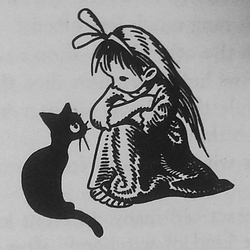I got told by a native that the 木という木 part is just すべて - so it’s just saying that all (or at least most of them) tall trees have bells hanging on top. ![]()
I mentioned in the home thread for the re-read that I took photos of the pictures used in the original English release of this book, since they’re not in later releases or the e-book. Here are the ones that appear before chapter one:
Table of Contents (Japanese), Chapter 1 (English)

Chapter one has one image, at the very end:
The village map is SO cute!
Ooh, looks like I lucked out. Other than the table of contents image, my copy of the book has all of those.
I wonder how old my copy is.
Edit: Well, in the back it says
一九八五年一月二五日初版発行
二〇一三年六月一〇日第七九刷
So I’m assuming that means it was initially published on the 25th of January, 1985, and that my specific book was part of the 79th printing, on the 10th of June, 2013.
Towards the end of the first chapter there is this sentence:
ほうきはめっちゃめっちゃにこわれ、キキのほうは鼻の頭と両足のひざっこぞうに合計三つもこびをつくってしまいました
I understand that she broke her broom and has three bumps (her nose and both legs) but the bolded part I can’t quite decipher. What is going on there?
For some reason the author threw in a small つ which is unknown to Jisho (sometimes this is done for emphasis, but I don’t reeeeally see the point here…); in Jisho it’s this word.
Oh my goodness I’ve even learned that word from Wanikani but that small つ killed me. Thank you!
I believe it’s more of a dialect variation rather than emphasis. This particular one comes from 甲州弁.
Yep, this is a case when monolingual dictionaries like Weblio really help:

If seems to be fairly extensive when it comes to looking up these dialectical words and phrases.
Would you mind popping that interpretation behind spoiler tags? Just for the benefit of those who haven’t finished the chapter ![]()
Sorry! I’ve only posted a few times and this is the first book discussion I’ve joined. I’ve updated the post.
Thank you for the explanation, also to @mrahhal!
What really confuses me though: Why would the author all of a sudden throw in a dialect word in a section that is not spoken by a character, in a text that is (to my understanding) pretty much standard Japanese? ![]()
I think this goes in hand a bit with how the author chose to narrate the story. It’s not an objective 3rd party narrator. Polite form is used in the narration, and it’s introducing you to the world in a friendly manner. This isn’t the go-to standard, so it’s not surprising that they chose to use a dialect variation that invites a non-standard world view maybe (it is a fictitious old world that has witches and magic). Or at least, that’s what came out off the top of my head.
No worries at all! Thanks for editing it ![]()
I’m finding that with the help of pre-learning some of the vocab, I’m able to understand more than I expected to (being in the low N4 region). I’m also enjoying reading it on a ereader where I can make kanji as big as want - a relief after mostly reading bad scans of manga with blurry kanji!
The bit I’m struggling with are when the Mom says (sorry for lack of page #… that’s the downside of ereaders…):
キキ、出発はいつにするつもりなの。もうそろそろきかせてくれてもいいんじゃないの。いつまでもぐずぐずのばすわけにはいかないわ。
So, I think I’ve got the first two sentences (which I was confused about until I remembered you could use の to ask a question). She’s saying: “Kiki, when is it you are planning to leave? It would be good if you told me before long”
For the last part:
いつまでも = Indefinitely
ぐずぐず = hesitatingly/tardily
のばす = to postpone
わけにはいかない = Must not/impossible to do
So… “You must not be tardily postponing” or in better English: “You can’t just keep postponing forever!”
Does that make sense? I actually think the thing that is confusing me the most is ぐすぐす and what exactly it is describing.
edit: added spoiler tags
That’s basically how it would translate! ぐずぐず is modifying the verb のばす, so it’s kinda like she is “hesitately/tardly postponing”, it gives a more exagerate impression.
I’d say your translation sounds about right to me.
As for what the adverb is doing (which @lukhart covered), sometimes it also helps me to look at Japanese definitions of the words.
Looking up 「のばすとは」 online for a definition, I get:
「時を長びかせる。特に、予定の日時を遅らせる。」
Meaning something like: “To prolong time. Especially, to delay the date and time of plans.”
Thus のばす tells us Kiki’s been putting off planning something. (Well, technically it’s saying this is what Kiki mustn’t do.)
But would caused this delay? Kiki being too busy? Would she be forgetful? Or too nervous? This is where we modify the verb with another word to narrow it down.
Looking up 「ぐずぐずとは」, I get:
「はきはき行動せずに時間を費やすさま。」
Meaning along the lines of: “Spend time without acting quickly.”
Thus, Kiki mustn’t delay putting off plans due to leisurely taking her time, dawdling.
Pretty dumb question here (expect a lot of those from me haha). From which verb does もない come from again? Can’t find anything on Jisho and I think it’s a standard thing. (I think I saw it on TK’s Guide somewhere?)
And do you anything special with the content or “do you just read it”? I seem to forget a lot of things over time.
It’s most likely the particle も followed by ない. If you post one or two examples I sure someone could confirm the specific usage.
A few minutes ago I had the amazing (cough) idea to search old posts and found, funnily enough, that it was exactly you who asked the same question for the same sentence 2 years ago.
But yeah, I think you’re right!




